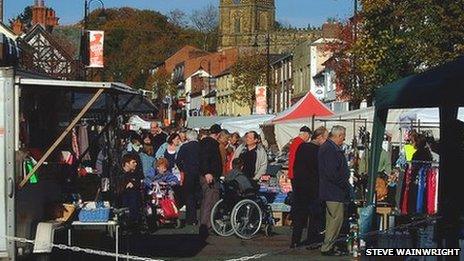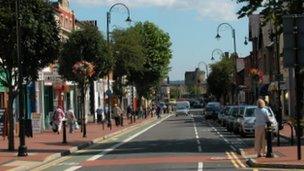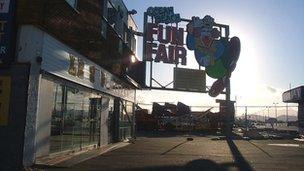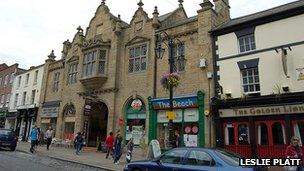Crunch Christmas: Market is key to Mold shopping success
- Published

Mold's success as a town has been put down to the popularity of its market
A Flintshire shopping street is bucking the national trend with every shop unit occupied, it has emerged.
Retailers and officials put the success of Mold's High Street down to the popularity of its long established and thriving market.
The town has a shop vacancy rate of 5% due to empty units elsewhere in the town, with the UK average at about 11%.
Towns across north east Wales say they are taking action to revive their fortunes with a number of projects.
But in Mold, Martin Jones from Vaughan Davies, an independent clothes shop, says the town's success is down to its "hustle and bustle", saying it creates a welcoming atmosphere, especially on market days.
Dave Hill, town centre manager for Mold, agreed saying the busy twice-weekly market was a big draw, making Mold a destination for visitors.
He said a well considered policy on parking charges - 20p for short stay and 50p over three hours - meant locals and town centre workers did not occupy all the spaces as they would if parking was free but that the charges did not act as a deterrent to other visitors.
"It is a significant issue. You need charges to manage the churn," he said referring to the continuous turnover of motorists parking in the town centre.
On Tuesday, retail expert Mary Portas published a report recommending getting town centres to run more like businesses in their own right while government research on High Streets' performance showed a third of them are "degenerating or failing".

Flint's 1970s maisonettes have been described as a "straitjacket" restricting town centre development
A Welsh Assembly inquiry is looking at ways to regenerate Welsh town centres while local authorities in north east Wales are already taking their own action.
Flintshire council is working with local businesses and other groups to create master plans, external for each of its towns to "put the heart back".
The plans to develop Buckley with new community facilities to bring more people into the town centre are said to be attracting "genuine interest" from developers.
On Tuesday, Flintshire councillors voted to push on with proposals to demolish Flint's 240 maisonettes which local councillor Alex Aldridge has described as a "straitjacket", restricting development over the years.
Under the plans, part of the council-owned land would be sold for development to finance other parts of the project with a mix of social housing and other community facilities.

Plans to redevelop Rhyl's former fair are on hold due to the economic downturn
In Rhyl, Denbighshire council says the key to reviving the resort's fortunes rests in finding a way to "attract and retain economically active people".
It is also investing £600,000 in a new bus station in Prestatyn, external in January while work is currently under way on a new town centre supermarket and shopping area which has been years in the planning.
The authority has also started a project in Denbigh, external to use vacant shop windows for promotional campaigns to improve the appearance of the historic main street while trying to encourage new and small businesses to occupy the premises.
At the beginning of the month it was awarded £78,750 in Welsh government money to improve the link between the town and its castle which is a big draw with tourists.
And it is being reported, external locally that Denbigh's old Kwik Save site has just been sold to a developer after standing empty for several years.
Councillor Raymond Bartley described the news as "an early Christmas present for the people of Denbigh".
In Wrexham, the council has been trying to find more ways to attract shoppers and visitors to the town centre, including offering free parking.

There have been calls to switch locations of Wrexham's street market to help other traders
And last month it announced a plan to operate a trial bus service to ferry shoppers around key parts of the main shopping areas, including through pedestrianised areas.
However, some traders and business leaders say Wrexham should play to its strengths and make more of its several indoor and outdoor markets.
Alex Jones, chair of Wrexham Chamber of Tourism & Trade, has suggested alternating the places used for on-street markets and adding more market days.
"Why not incorporate them around the town?" he said. "Wrexham is a market town - it needs markets."
- Published14 December 2011
- Published6 October 2011
- Published30 August 2011